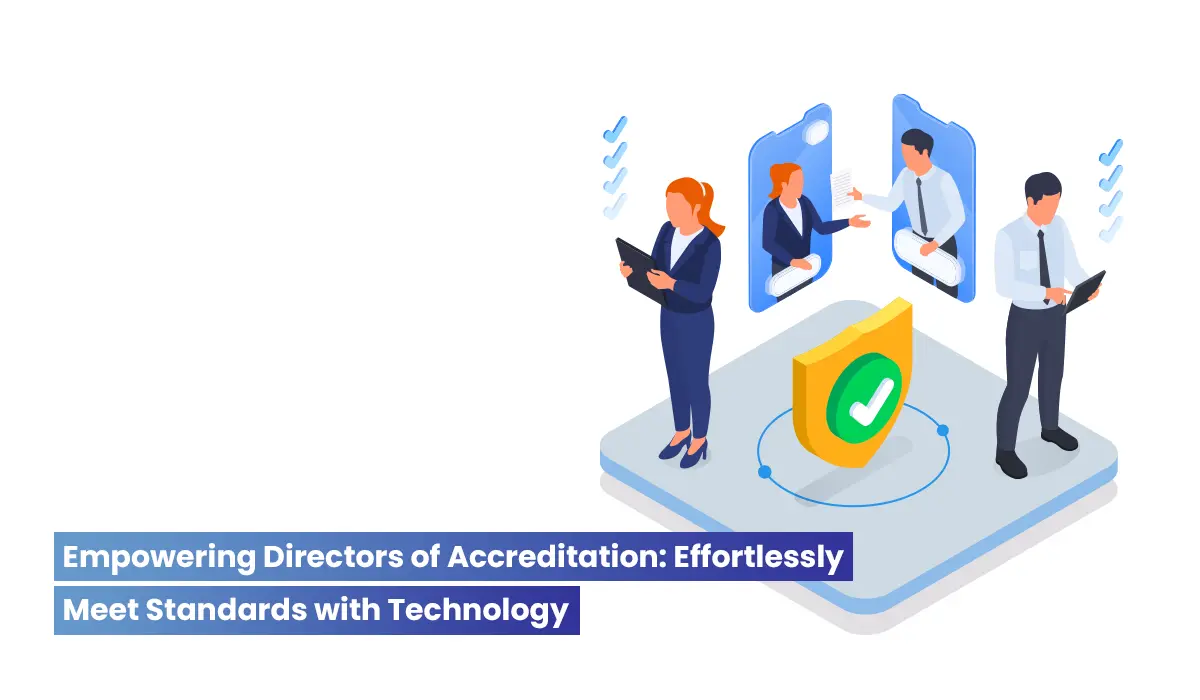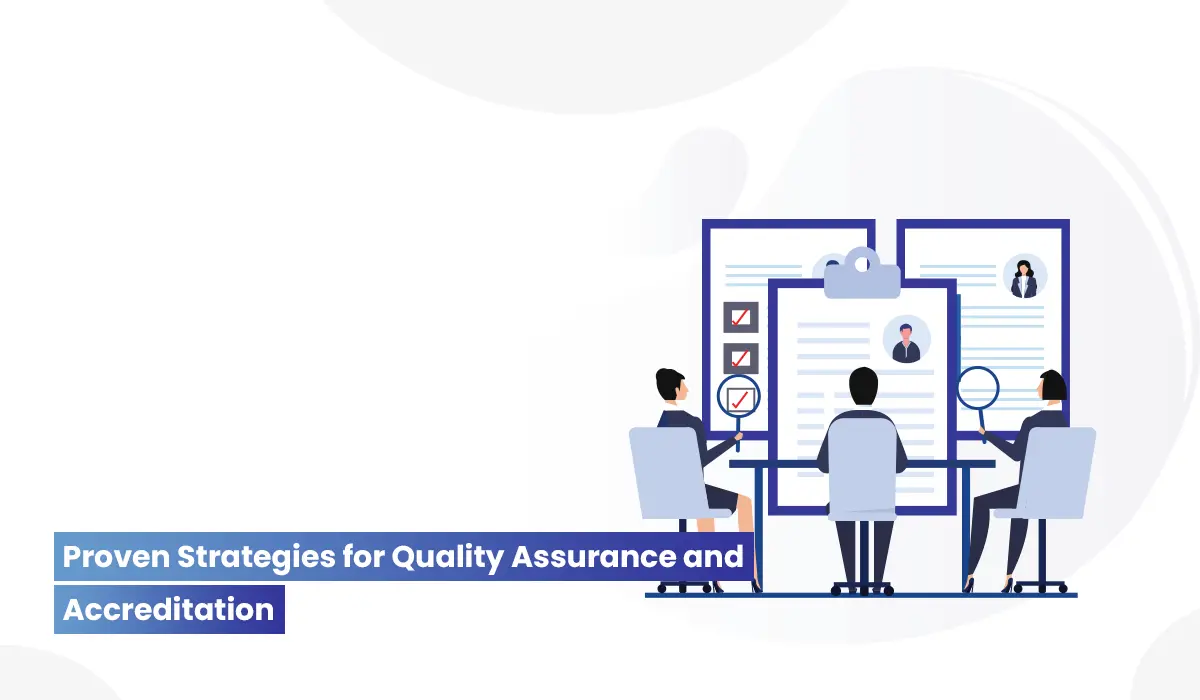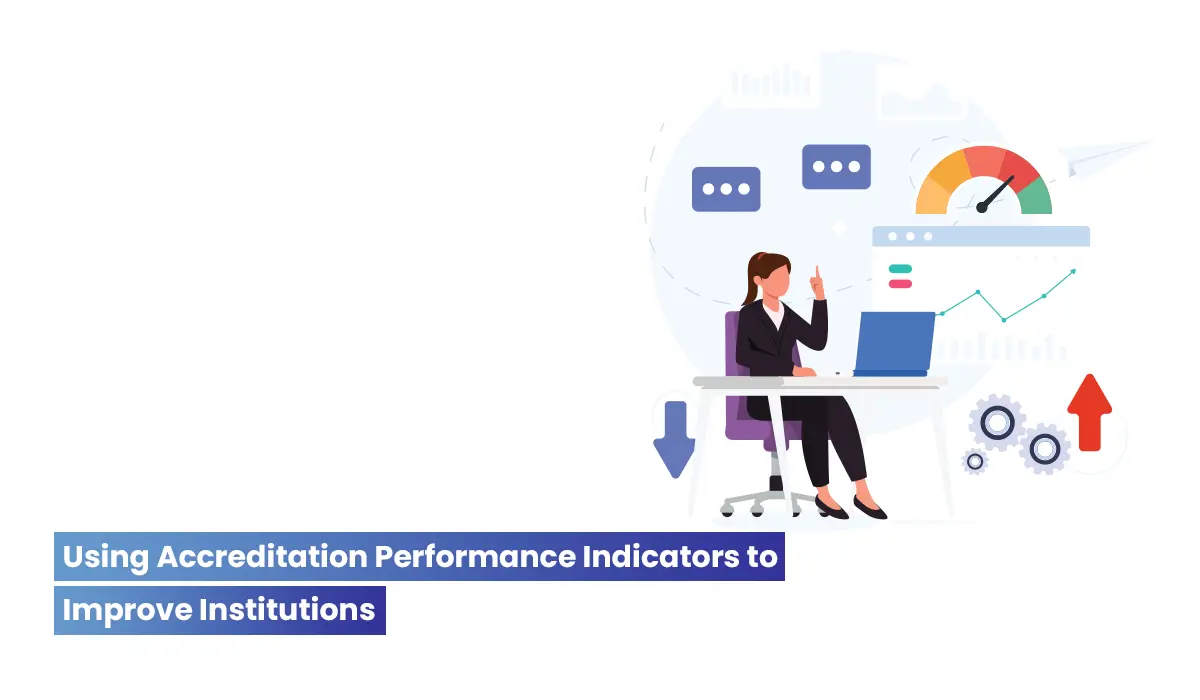The benefits and process of EQUIS Accreditation for European Higher Education
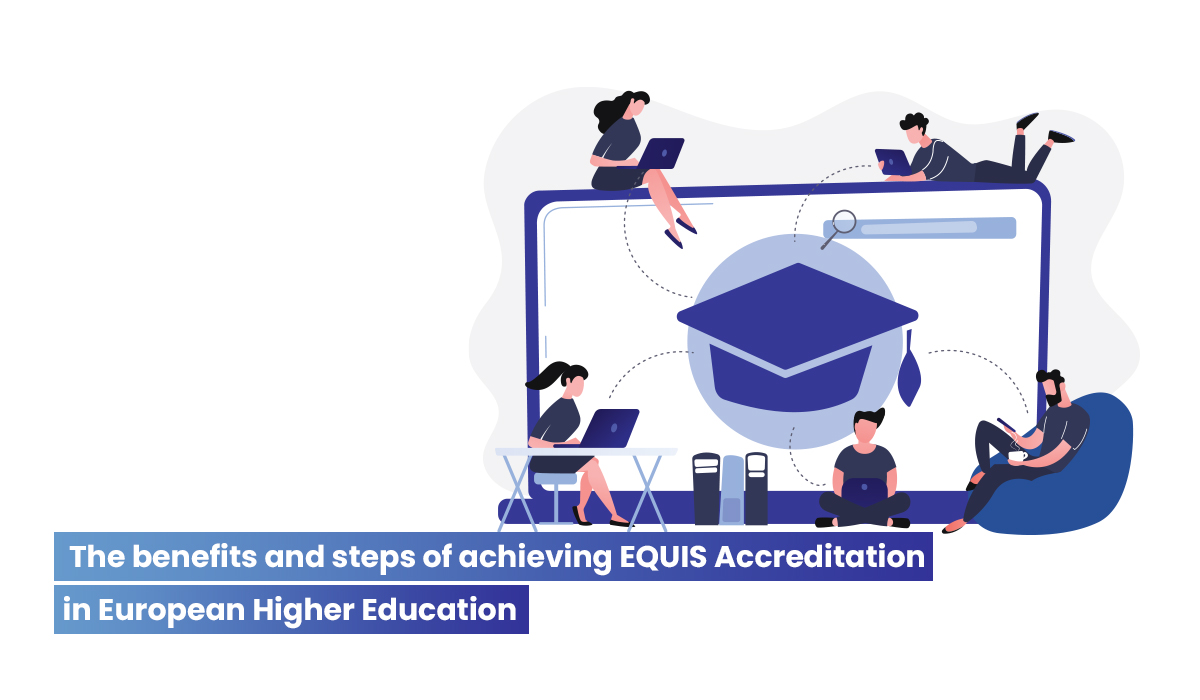
The benefits and process of EQUIS Accreditation for European Higher EducationAs the world becomes more interconnected and competitive, European higher education institutions are seeking ways to distinguish themselves and enhance their global reputation. One way to achieve this is through accreditation by international organizations such as the European Quality Improvement System (EQUIS). EQUIS is a prestigious and rigorous accreditation system that assesses the quality of management education offered by higher education institutions.
In this blog, we will explore the benefits and process of EQUIS accreditation for European higher education institutions. We will also delve into the whole accreditation process involved in obtaining EQUIS accreditation and provide recommendations for institutions seeking to pursue this accreditation.
All this is aimed at providing you with a better understanding of the benefits and process of EQUIS accreditation and how it can help European higher education institutions achieve their goals of excellence and competitiveness in the global education landscape.
What is EQUIS accreditation?
EQUIS Accreditation is a globally recognized mark of quality and excellence in management education offered by European higher education institutions. EQUIS is a rigorous and comprehensive accreditation system that assesses the quality of an institution's management education, including its programs, faculty, research, and operations.
It evaluates an institution's performance against international standards and benchmarks, including leadership, governance, student services, faculty qualifications, research output, internationalization, and corporate connections.
EQUIS Accreditation is awarded by the European Foundation for Management Development (EFMD), an international organization that promotes excellence in management education and development. EQUIS Accreditation is designed to ensure that accredited institutions are delivering high-quality management education that meets the needs of students, employers, and society at large. It also provides a framework for continuous improvement and encourages institutions to stay at the forefront of innovation and best practices in management education.
Benefits of EQUIS Accreditation
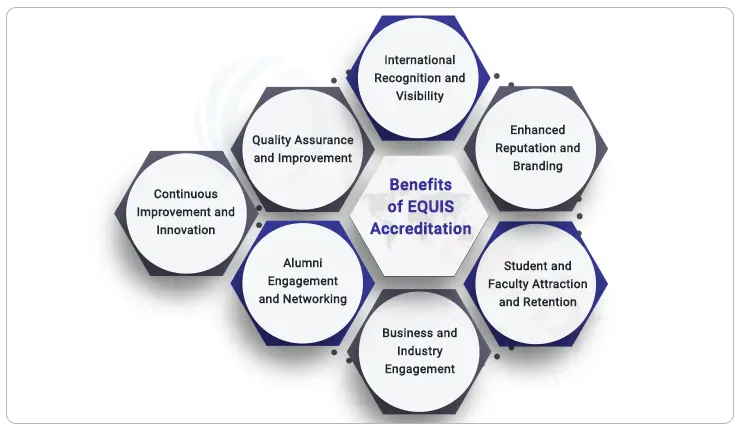
EQUIS Accreditation provides numerous benefits for European higher education institutions which help institutions enhance their competitiveness, attract high-quality students and faculty, improve their performance, and position themselves as global leaders in management education.
- International recognition and reputation
- Quality assurance and continuous improvement
- Networking and collaboration opportunities
- Student Attraction and Employability
- Funding and investment opportunities
- Enhanced institutional visibility and profile
- Increased credibility and trust among stakeholders
- Improvement in academic and research standards
- Alignment with international best practices and standards
- Promotion of innovation and creativity in teaching and learning
- Development of a culture of excellence and quality in management education
- Recognition of excellence in specific programs or departments within the institution
- Opportunities for benchmarking and learning from other EQUIS-accredited institutions.
Process of EQUIS Accreditation
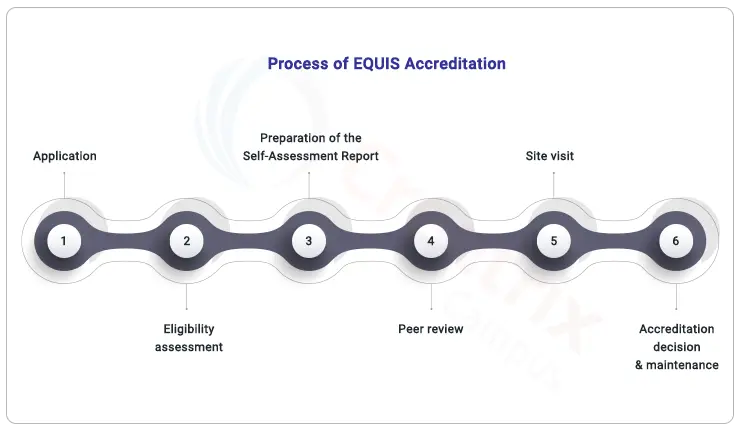
The process of EQUIS Accreditation is a comprehensive and rigorous evaluation of an institution's management education, including its programs, faculty, research, and operations. The process typically takes 12-18 months and involves the following steps:
Eligibility check
Institutions interested in EQUIS Accreditation must first complete an eligibility check to ensure that they meet the minimum standards for accreditation. This check involves a review of the institution's mission, governance, and academic programs, as well as an assessment of its ability to meet the standards of EQUIS Accreditation.
Pre-assessment
Once an institution has been deemed eligible, it must undergo a pre-assessment visit by an EQUIS Accreditation expert. This visit provides the institution with an opportunity to learn more about the EQUIS Accreditation process and to discuss any questions or concerns with the expert.
Self-assessment
Institutions that pass the pre-assessment visit must complete a self-assessment report that provides detailed information on their management education, including their mission, vision, and values, program portfolio, faculty qualifications, research output, internationalization efforts, and corporate connections. The report must also identify areas of strength and weakness, and propose a plan for improvement.
Peer review
The self-assessment report is then reviewed by a team of international peer reviewers who have expertise in management education. The peer review team typically includes faculty, administrators, and industry experts who conduct a thorough evaluation of the institution's management education based on the EQUIS Accreditation criteria.
Site visit
If the peer review team determines that the institution meets the EQUIS Accreditation standards, a site visit is conducted by the peer review team to verify the information provided in the self-assessment report. The site visit typically involves meetings with faculty, students, staff, alumni, and corporate partners to gain a comprehensive understanding of the institution's management education.
Accreditation decision
Based on the self-assessment report, peer review, and site visit, the Accreditation Board of EFMD makes a decision on whether to award EQUIS Accreditation to the institution. The decision is based on whether the institution meets the EQUIS Accreditation standards, and if so, for how long.
Maintenance of accreditation
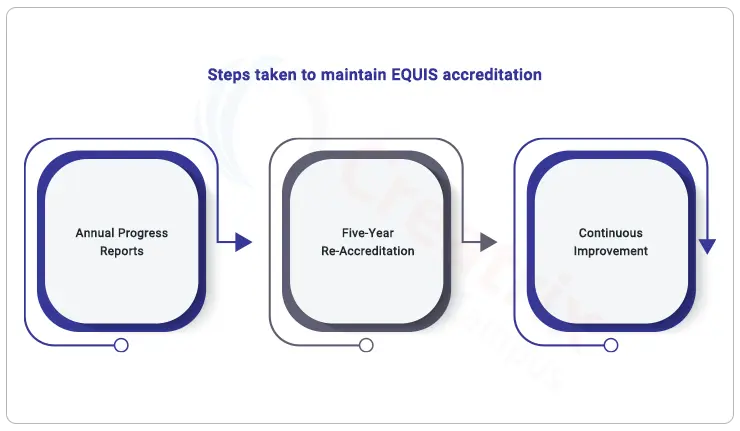
Once an institution is awarded EQUIS Accreditation, it must maintain its accreditation status by undergoing regular reviews and reporting to EFMD on its progress in meeting the EQUIS Accreditation standards.
Case Studies of EQUIS-accredited Schools in Europe
We have captured some of the few institutions that are EQUIS-Accredited in Europe. These are committed to providing high-quality management education programs and continuous improvement.
HEC Paris - France: HEC Paris is a leading business school in France and one of the oldest and most prestigious institutions of higher education in Europe. It has been awarded EQUIS Accreditation multiple times, recognizing its commitment to excellence in management education.
Rotterdam School of Management, Erasmus University - Netherlands: The Rotterdam School of Management, Erasmus University is a top-ranked business school in the Netherlands. It has been accredited by EQUIS since 1998 and has since developed a reputation for its innovative approach to teaching and research.
Copenhagen Business School - Denmark: Copenhagen Business School is a leading business school in Denmark and has been accredited by EQUIS since 2000. The institution is renowned for its commitment to sustainable business practices and its focus on providing a challenging and dynamic learning environment for students.
IMD Business School - Switzerland: IMD Business School is a top-ranked business school located in Switzerland. It has been accredited by EQUIS since 1997 and has since developed a reputation for its excellence in executive education and leadership development.
ESADE Business School - Spain: ESADE Business School is a leading business school in Spain and one of the oldest and most prestigious institutions of higher education in Europe. It has been accredited by EQUIS since 1997 and has since developed a reputation for its focus on ethical and responsible leadership.
How challenging can the EQUIS accreditation process be for higher education institutions?
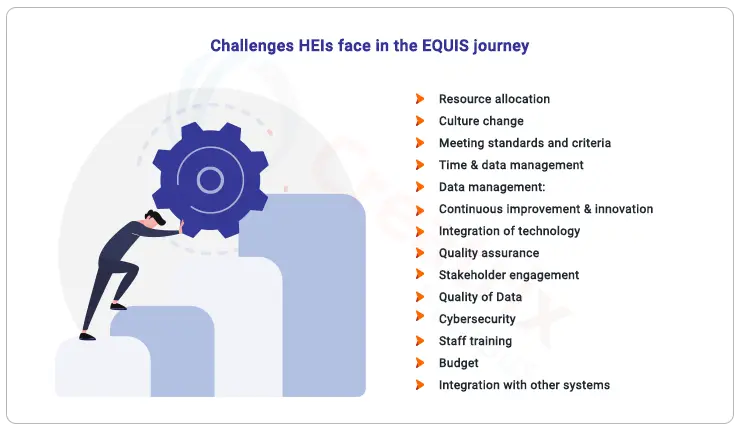
While EQUIS Accreditation is a valuable and prestigious mark of quality in management education, the process of accreditation can be complex and time-consuming. With the advent of software automation and digital technologies, there are several challenges and considerations that institutions should keep in mind as they navigate the EQUIS Accreditation process.
Here are a few:
Time and resource management:
Preparing for accreditation can be a time-consuming and resource-intensive process, requiring institutions to devote significant staff and faculty time to gathering and analyzing data, preparing self-assessment reports, and engaging with the accreditation process.
Institutional buy-in and support:
Achieving accreditation requires buy-in and support from all levels of the institution, from top leadership to faculty and staff. Ensuring that everyone is aligned and committed to the process can be a significant challenge.
Balance of global standards and local specificities:
EQUIS accreditation is based on global standards for management education, but institutions also need to balance these standards with their own local specificities, including cultural and institutional contexts. Striking the right balance can be challenging.
Assessment of teaching and learning quality:
One of the key requirements for EQUIS accreditation is demonstrating the quality of teaching and learning. This requires institutions to have rigorous systems in place for evaluating and improving teaching and learning, which can be challenging to develop and maintain.
Keeping up with changing accreditation requirements:
Accreditation requirements can change over time, and institutions need to stay up-to-date with these changes and adapt their practices accordingly. This can require ongoing investment in staff and faculty development and continuous improvement initiatives.
Data management:
The EQUIS Accreditation process involves gathering and analyzing a vast amount of data, including student and faculty profiles, course offerings, research output, and alumni feedback. Software automation can help institutions manage this data more efficiently, but it also requires careful planning and coordination to ensure that the data is accurate, consistent, and reliable.
Integration of technology:
As institutions increasingly rely on technology to deliver their management education, it is important to demonstrate how technology is integrated into the curriculum and how it supports student learning outcomes. Institutions should consider how software automation can enhance the student experience and how they can measure the impact of technology on student achievement.
Continuous improvement:
EQUIS Accreditation is a continuous improvement process that requires institutions to regularly evaluate and improve their management education programs. Software automation can help institutions identify areas of improvement more efficiently and track progress over time, but it is important to ensure that automation does not replace human judgment and critical thinking.
Quality assurance:
Software automation can help institutions ensure that they are meeting the EQUIS Accreditation standards, but it is important to remember that quality assurance is not just about meeting the standards. Institutions should consider how software automation can support a culture of continuous improvement and help them go beyond the minimum requirements of accreditation.
Stakeholder engagement:
EQUIS Accreditation involves engaging a wide range of stakeholders, including faculty, students, alumni, and corporate partners. Institutions should consider how software automation can support stakeholder engagement and communication, but they should also be aware of the limitations of technology in building relationships and fostering trust.
Quality of Data:
While software automation can help institutions gather and manage large amounts of data, it is important to ensure that the data is accurate, reliable, and relevant. Institutions should consider how they can validate the data and ensure that it meets the EQUIS Accreditation standards.
Cybersecurity:
Institutions should take steps to protect their data and ensure that their systems are secure from cyberattacks and data breaches. This includes implementing robust security protocols, training staff on cybersecurity best practices, and regularly monitoring for security threats.
Staff training:
Institutions should provide staff with the necessary training and support to effectively use software automation tools for EQUIS Accreditation. This includes training on data collection and management, analysis and reporting, and quality assurance.
Budget:
Implementing software automation tools for EQUIS Accreditation can require a significant investment in terms of time, money, and resources. Institutions should carefully consider the costs and benefits of automation and ensure that they have a clear budget and plan in place.
Integration with other systems:
Institutions should consider how software automation tools for EQUIS Accreditation can be integrated with other institutional systems and processes, such as student information systems, learning management systems, and institutional research databases.
Automate EQUIS accreditation with Creatrix Campus Automation
EQUIS Accreditation is likely to continue to play a significant role in the European higher education landscape, as institutions seek to enhance their competitiveness and reputation on a global scale. The process can be time-consuming and arduous.
While software automation can offer numerous benefits for institutions seeking EQUIS Accreditation, it is important to approach the process with careful planning, attention to detail, and a focus on continuous improvement. By leveraging the power of automation and digital technologies, institutions can enhance the quality of their management education programs and position themselves as leaders in the field.
Creatrix Campus is a comprehensive education management system that includes modules for accreditation management, curriculum management, student management, and more. By using the accreditation management module, institutions can automate many aspects of the EQUIS Accreditation process, including:
Documentation management:
Manage all documentation related to EQUIS Accreditation, including self-assessment reports, program reviews, and other supporting materials.
Workflow management:
Guide institutions through each stage of the accreditation process with workflows that can be customized to meet the specific needs of each institution, and they can be configured to send automated reminders and notifications to stakeholders as needed.
Collaboration and communication:
Allow stakeholders to work together and share information in real time with tools for document sharing, discussion forums, and video conferencing.
Data analysis and reporting:
Track and analyze data related to the accreditation process, including student performance, faculty qualifications, and program outcomes, and generate reports that support the accreditation process.
Improve transparency and accountability:
With all documentation and data centralized in one system, institutions can provide greater transparency and accountability and help build trust and confidence in the institution and its management education programs.
Reduce errors and inconsistencies:
By automating workflows and data entry, institutions can reduce the risk of errors and inconsistencies in the accreditation process.
Increase efficiency and productivity:
Automating EQUIS Accreditation with Creatrix Campus can help institutions save time and resources by eliminating manual processes and streamlining workflows. This can free up staff and faculty to focus on other important tasks and initiatives.
Enhance institutional reputation:
Achieving EQUIS Accreditation is a significant accomplishment that can enhance an institution's reputation and visibility in the global higher education landscape.
Conclusion
EQUIS Accreditation is a valuable tool for European Higher Education Institutions seeking to enhance the quality and competitiveness of their management education programs. By effectively managing the accreditation process, institutions can realize a range of benefits and improve their overall performance and impact in the global higher education landscape.
If you are a European higher education institution seeking to enhance the quality and competitiveness of your management education programs, EQUIS Accreditation may be the right choice for you. To learn more about the benefits, process, challenges, and considerations of EQUIS Accreditation, as well as how automation with Creatrix Campus can help streamline the process, read our full blog.
Request a live demo today to find out how Ceatrix can help your institution achieve EQUIS Accreditation and improve its overall performance and impact.
Disclaimer:
Please note that Creatrix Campus is not an accreditation agency and does not provide accreditation. Our software is designed solely to streamline the accreditation process and improve efficiency for educational institutions seeking accreditation from the European Quality Improvement System (EQUIS). We're proud to offer an innovative solution that simplifies the accreditation process and improves the efficiency of business schools seeking accreditation from EQUIS. However, it's important to note that the final decision regarding accreditation status rests solely with EQUIS.

